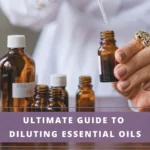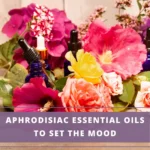As an Amazon Associate I earn from qualifying purchases. See Full Disclosure Here
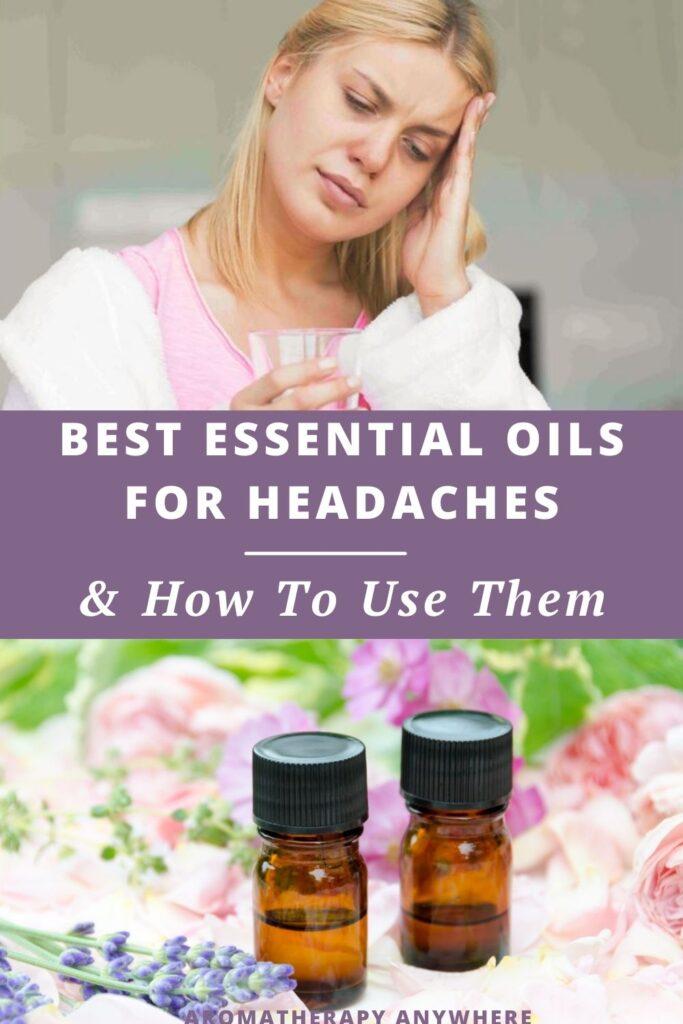 Essential oils for headaches offer a gentle yet effective way to soothe the throbbing pain leaving you feeling refreshed and re-energized. These oils work because of their strong analgesic and inflammatory properties.
Essential oils for headaches offer a gentle yet effective way to soothe the throbbing pain leaving you feeling refreshed and re-energized. These oils work because of their strong analgesic and inflammatory properties.
When using essential oils for headache relief, the key is to know which oils are best for different types of headaches. It’s equally important to know how to use essential oils for headaches.
A Quick Look At Using OTC Medication Vs. Essential Oils For Headache Relief
Headaches can be caused by any number of reasons from persistent stress and tension to dehydration, allergies, hormonal imbalance, and excessive alcohol consumption.
They can be debilitating. Worse still, they often strike when you least expect it. Completing even the smallest task can be a challenge when you’re dealing with a roaring headache and getting through the day can be a struggle.
Almost everyone experiences headaches at some time or the other but for some, headaches are a way of life. They occur far too often leaving the sufferer feeling exhausted and annoyed all the time.
While it’s okay to take an over-the-counter pill for an occasional headache, it’s not advisable if you experience persistent headaches. Taking OTC pills regularly for any type of pain can have adverse effects on your body.
For persistent headaches, it’s much better to resort to natural remedies such as herbs, baths, and essential oils.
There are a variety of essential oils you can use to combat headaches. Each of these oils has a different set of properties and works in a slightly different way to offer relief from headaches. Regardless, they all work.
What’s great about having a range of essential oils for headaches is that you’re not stuck with any one aroma. If you don’t like the aroma of a particular oil, you can simply try another till you find the one that resonates with you and provides the headache relief you are seeking.
Below you’ll find some of the best essential oils for headaches and how to use them.
LAVENDER: BEST ESSENTIAL OIL FOR STRESS HEADACHE
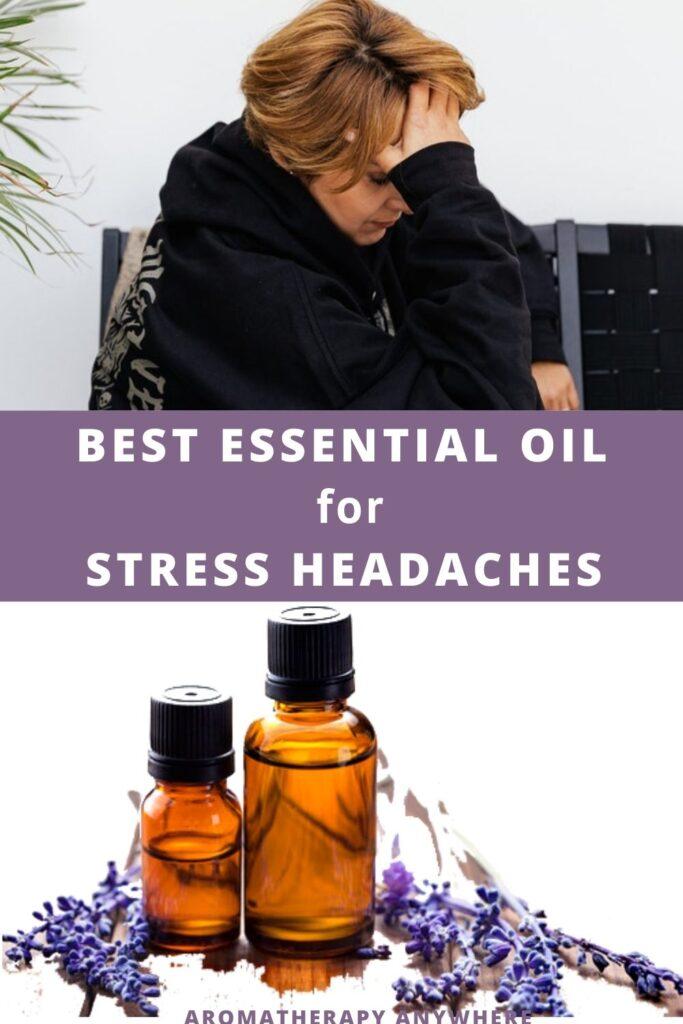 This study, published in European Neurology, suggests that inhaling lavender essential oil may be safe and effective in the acute management of migraine and stress headaches. In the study, migraine sufferers who inhaled the scent of lavender experienced less severe migraine headaches than those who inhaled a placebo.
This study, published in European Neurology, suggests that inhaling lavender essential oil may be safe and effective in the acute management of migraine and stress headaches. In the study, migraine sufferers who inhaled the scent of lavender experienced less severe migraine headaches than those who inhaled a placebo.
Lavender essential oil has several different therapeutic and curative properties that make it so effective for reducing headaches and migraines. Its sweet floral aroma calms the body and mind, creating harmony and tranquility. Its aroma promotes relaxation and soothes our senses.
Lavender is the best essential oil for stress headaches. There’s no doubt that inhaling its aroma offers tremendous stress relief. It releases pent-up stress and tension, which contribute to throbbing stress headaches and migraine. Inhaling the aroma of lavender induces relaxation and reduces tension and anxiety.
In addition, lavender essential oil also has analgesic or pain-relief properties. The analgesic action of the oil, together with its relaxing effects on the nervous system, make lavender a good essential oil for headache relief.
Lavender is one of those oils that work well to relieve all types of headaches, including migraine headaches. It regulates serotonin levels, which in turn minimizes pain in the nervous system. By inducing calm and relaxing, it helps soothe stress headaches. Its sleep-inducing effects help calm headaches brought on by lack of sleep.
The best part of using lavender essential oil for headaches is that it is very mild and is safe to use on children.
How To Use Lavender Essential Oil For Headaches
There are several different ways to use lavender essential oil for stress headaches.
- Add a few drops to your diffuser and inhale the aroma of the oil.
- Diffusing lavender essential oil at night is the best way to alleviate headaches brought on by lack of sleep. The sleep-inducing aroma of lavender will help you sleep better and wake up headache-free.
- Alternately, make your own relaxing pillow spray with lavender oil and spray your pillow before getting into bed.
- If you don’t have an aromatherapy diffuser, simply add 1 to 2 drops of the oil to a cotton ball. Hold the cotton ball up to your home and inhale.
- Another way to use lavender essential oil for headaches is to mix a few drops with a carrier oil such as coconut or evening primrose oil. Gently massage this blend around your temples and back of your neck to relieve migraine headaches.
- Add a few drops to a warm bath and soak in it for at least 15 to 20 minutes. How to use essential oils in the bath.
- No time for a bath? Learn how to use lavender essential oil in the shower to calm that headache.
PEPPERMINT: BEST ESSENTIAL OIL FOR TENSION HEADACHES

Peppermint essential oil is very effective for easing tension headaches. This menthol-rich oil is particularly effective for headaches caused by extreme tension, sinusitis, and hangovers.
From its pleasant minty aroma to its immensely cooling sensation and pain-relief properties, menthol works several different ways to provide headache relief.
The pleasant menthol aroma of peppermint essential oil is immensely refreshing, uplifting, and energizing. This makes the oil a particularly great option for daytime headache relief as it also helps boost focus and energy levels.
Peppermint is also the best essential oil for relieving headaches brought on by sinusitis. The menthol content of the oil activates the mucus receptors in the nose and clears the mucus. This opens up the airways, reduces congestion, and eases sinus-related symptoms including headaches.
How To Use Peppermint Essential Oil For Headaches
- Diffuse peppermint oil throughout the day. Inhaling the aromas as you go about your day will keep you feeling refreshed, revitalized, and headache-free. Avoid using this oil at night though as it will keep you awake instead of helping you sleep.
- Mix a few drops with a carrier oil such as coconut or evening primrose and gently rub around the temples. When applied to the forehead, peppermint oil delivers a wonderfully cooling sensation. It also stimulates circulation and reducing muscle contractions that cause headaches.
- Set up a steam bath with peppermint essential oil. Add a few drops to a bowl of hot water. Drape a towel over your head and inhale the aromas.
- Add peppermint oil to a warm bath.
EUCALYPTUS: BEST ESSENTIAL OIL FOR SINUS HEADACHES
 Eucalyptus is the best essential oil to use for headaches caused by sinus issues. Rich in 1.8-cineol, also known as eucalyptol, eucalyptus is well known for reducing inflammation and soothing sinus-related problems.
Eucalyptus is the best essential oil to use for headaches caused by sinus issues. Rich in 1.8-cineol, also known as eucalyptol, eucalyptus is well known for reducing inflammation and soothing sinus-related problems.
Inhaling the aroma of eucalyptus oil clears the sinuses and opens up the nasal passages, relieving sinus tension, which causes headaches.
Eucalyptus essential oil also refreshes and stimulates the brain, reducing mental exhaustion and fatigue. Topical application is known to soothe pain and reduce inflammation.
How To Use Eucalyptus Essential Oil For Sinus Headaches
- Add a few drops to your inhaler and inhale the aromas to clear the sinuses and relieve sinus-related headaches.
- Blend a few drops with coconut oil and apply to the nose, temples, and chest to open up nasal passages and relieve sinus tension.
- Diffusing eucalyptus and peppermint essential oils together provides relaxing effects to both, muscles and the mind, which works wonderfully to soothe headaches and migraines.
- Set up a steam bath using eucalyptus oil. Add a few drops of oil to a bowl of hot water. Drape a towel over your head and inhale the aromas.
27 Ways to Use Eucalyptus Essential Oil for Health & Home
Spearmint Essential Oil: Best Essential Oil For Mild Stress Headaches
Spearmint is another essential oil from the same aroma family. It has the same aroma and effects as peppermint essential oil but the scent is milder.
If you love the minty, refreshing aroma of peppermint but find it a bit too overpowering for you, try diffusing spearmint essential oil. Spearmint essential oil also contains menthol, which gives the oil its headache-relief properties but with a more subtle scent than peppermint.
How to use spearmint for headaches
Spearmint essential oil can be used to relieve headaches the same way as peppermint.
- Add a few drops to your diffuser and inhale the aromas.
- Mix with a carrier oil and apply to the temples and wrist.
- Add to a warm bath and soak in it for a while.
This Bath & Body Works Stress Relief 3-Wick Candle is scented with spearmint and eucalyptus oils and works wonderfully to relieve stress headaches.
Roman Chamomile: Best Essential Oil Insomnia-Related Headaches
If your persistent headaches are caused by chronic insomnia, using Roman chamomile can help.
Roman chamomile essential oil induces a feeling of calm and relaxation that is conducive to falling asleep. On a physical level, its anti-inflammatory properties help relax the muscles and alleviate aches and pains. These properties make it a good essential oil for headaches caused by insomnia and lack of sleep.
Roman chamomile’s soothing properties are also effective for easing anxiety, which is a common cause of headaches.
How to use roman chamomile essential oil for headaches
- Add a few drops to your diffuser. Diffusing Roman chamomile essential oil at night is the best way to soothe headaches brought on by lack of sleep. The sleep-inducing aroma of the oil will help you sleep better and wake up feeling relaxed and head-ache-free.
- Add a few drops to a warm relaxing bath and soak in it for some time preferably before going to bed
- If you don’t have an aromatherapy diffuser, you can get the benefits of chamomile oil by simply adding 1 to 2 drops of the oil to a cotton ball. Hold the cotton ball up to your home and inhale.
- Alternately, make your own relaxing pillow spray with Roman Chamomile oil and spray your pillow before getting into bed.
Another way to use chamomile essential oil for headaches is to mix a few drops with a carrier oil such as coconut or evening primrose oil. Gently massage this blend around your temples and back of your neck to relieve migraine headaches.
How to Use Essential Oils to Soothe Your Headache
The easiest way to soothe your headache is by adding a few drops of any one of the oils or blends above in your diffuser. Switch the diffuser on, sit back, and inhale the aroma of the oil.
If you do not have a diffuser, put a few drops of the oil on a tissue, hold it up to your face, and inhale the aroma. Be careful not to touch the tissue to your mouth or face.
Topical application is also very effective. Mix 2-3 drops of your chosen oil with a carrier oil such as jojoba or sweet almond, and gently massage your temples and forehead. The aroma of the oil and the massage both work together to soothe your headache.
There is substantial research to show each of these oils is useful. Each of these oils has strong inflammatory and analgesic properties that help to soothe a headache. You have the option to use each of these oils topically or orally. Next time you have a headache, try one of these oils for relief.
You may also be interested in:
How To Use An Essential Oil Diffuser
How To Use Essential Oils In The Bath
Best Essential Oil Diffuser For Large Rooms
Best Essential Oils for Hangovers
How To Use Essential Oils in the Shower
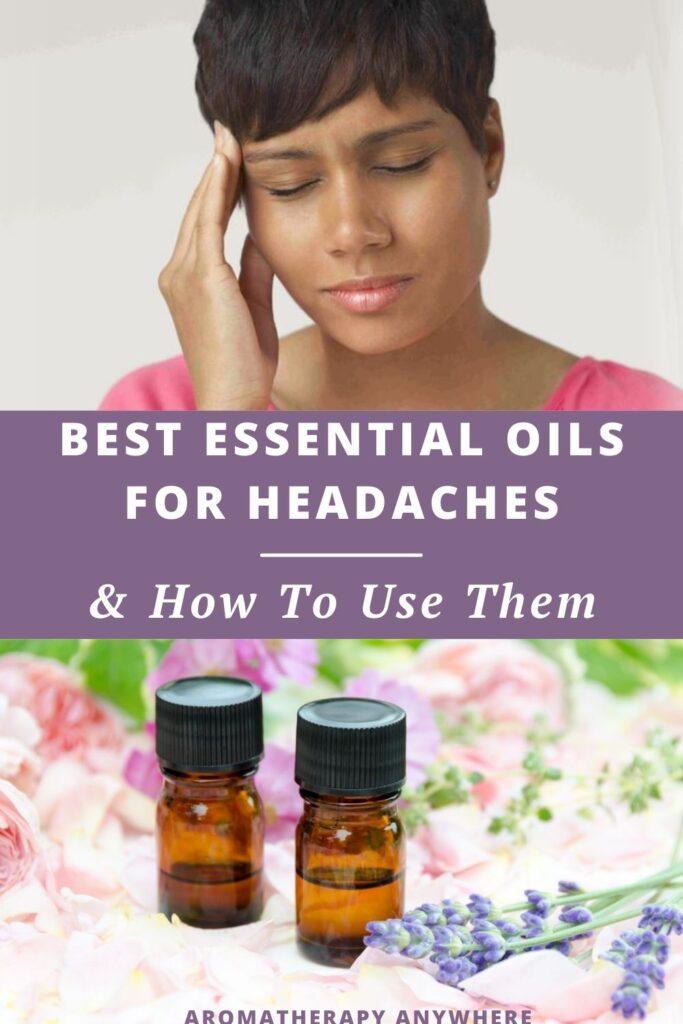
Disclaimer: This information is not intended to serve as medical advice. Please consult your doctor before using any natural medication or if you experience any unusual symptoms. See Full Disclaimer here.





